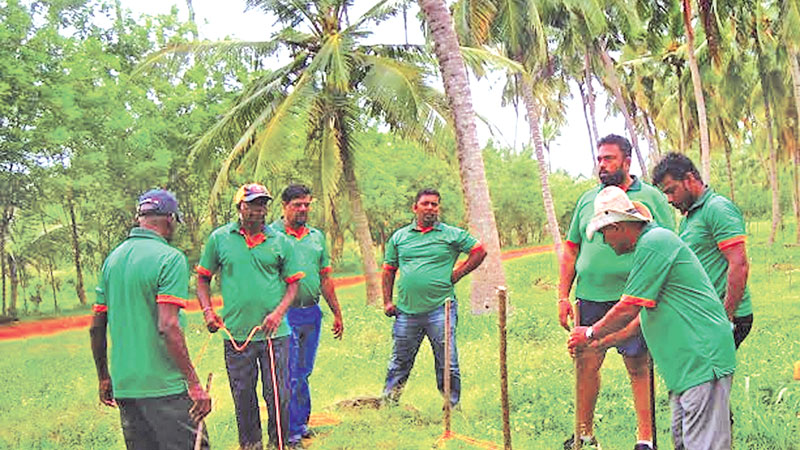Planting of gliricidia specially in coconut estates in the country would play a big role in finding solutions to the ever-growing crisis in supply of electricity in the country. It is claimed that gliricidia is an alternate and could replace coal imported from overseas saving much needed foreign exchange.
The BioMass Supplies (Pvt) Company which plays a leading role in introducing gliricidia as an intercrop specially in coconut estates, assists greatly in the production of biogas via planting gliricidia.
The Coconut Plantation Societies in the Puttalam district have shown keen interest in planting gliricidia in the coconut estates coming under their purview in collaboration with the said company from May this year.
Last week the BioMass Chilaw office conducted a demonstration session for the benefit of the Chilaw plantation officials at their Palugaswewa Coconut Estate, to show how scientifically one could plant gliricidia as an intercrop.
As a result of it being planted systematically within the coconut estates, the green matter of gliricidia-sepium automatically turns into organic input within the plantation, increasing the capacity to increase the number of coconuts from each tree.
The company has assured them that growing gliricidia as an intercrop would earn them an extra income while ensuring the absorption of the needed amount of nitrogen to the soil. The roots of the coconut tree loosen the soil allowing more water to take in and reduce the damage caused by insects and add fertilizer necessary for coconut trees. It develops soil structure, air raising capacity and water retention capacity.
Biomass, a member of the Roundtable on Sustainable Biomaterials (RSB) since 2015, is a private sector company with expertise in the emerging field of alternative energy drawn from renewable resources. The company serves early stage companies seeking its advice and knowhow to accelerate growth.
We are members of the RSB since 2015. Like the organic, they are the body. If someone, is in the BioMass business, RSB, as a world organization body has the right to issue the Validation Certificate and is also in a position to trace those registered with it via GPS, a device connected to the mobile. It helps collection of detailed information, including the global positioning of the land/farm as well. It is able to collect information such as where the stuff come from and the quantity chopped. Gliricidia though grown as an intercrop, does not replace forest. It is food and fuel. It does not affect the soil but its leaves become fertilizer. The roots give nitrogen to the soil.
BioMass Manager Supply Ruchitha Kurera pointed out that biomass was a renewable resource and ecologically clean fuel that we could use more effectively.
BioMass commenced work in 2012 in Kantale and work really started in 2014 with the recruitment of office staff. Kurera went on to say though the company was yet in the process of establishing itself after receiving Cabinet approval, it has got involved in making pallets which could be used to generate power. “We are making pallets and that can be used in power generation. We export our product directly to Japan. We ourselves are not generating power but sell it to people who generate power here or anywhere else. We supply our products directly from our plant at Kantale to local and foreign companies without any modification and their boilers could co-fire with coal, 5 to 10 percent and meet their requirements."
 He also said that the company works in liaison with coconut, paddy farmers and other crop cultivators. "We have 40,000 registered farmers and we conducted well over 600 farmer training programmes to benefit them. They, with their added knowledge, have taken the task of growing gliricidia trees. By now, a total of 50 million trees have been planted and they are supervised by our field officers. We recommend 450 trees for an acre in coconut plantation within the land and gliricidia could also be grown along the fence. The harvesting is done once a year."
He also said that the company works in liaison with coconut, paddy farmers and other crop cultivators. "We have 40,000 registered farmers and we conducted well over 600 farmer training programmes to benefit them. They, with their added knowledge, have taken the task of growing gliricidia trees. By now, a total of 50 million trees have been planted and they are supervised by our field officers. We recommend 450 trees for an acre in coconut plantation within the land and gliricidia could also be grown along the fence. The harvesting is done once a year."
He said when growth reaches maximum at the end of one year, the company purchases the gliricidia trunks from the cultivators or the farmers. Farmers will be able to earn Rs. 10,800 per acre.
"We never cut the trees from the bottom. We cut them three feet (3) above and that helps sustainability and ensures continuance of their further growth. We sell the logs purchased from the farmers to local buyers. Those who buy, put the logs into gas-fire. The gas-fire generate steam and this is called 'dendro power'. It is not just burning wood, you burn to get gas. It is called gastificasion. That is the process the said companies adopt," Kurera said.
Anura Siriwardene, Puttalam District Manager, with his office at Pambala in Chilaw, said that the company was in the process of developing the Puttalam district and opened the office in Chilaw two month ago. "In Puttalam district, we have 30,000 acres of gliricidia grown as an intercrop and we expect 135,000 fuel-wood from Puttalam.
We have 17 field officers attached to our Chilaw office and our massive network extends Trincomalee to Anuradhapura, Padaviya, Gomarankadawala, Moravewa to the district of Vavunia, and then from our network from Polonnaruwa, Medirigiriya, to the outskirts of Batticaloa," he said.



Add new comment